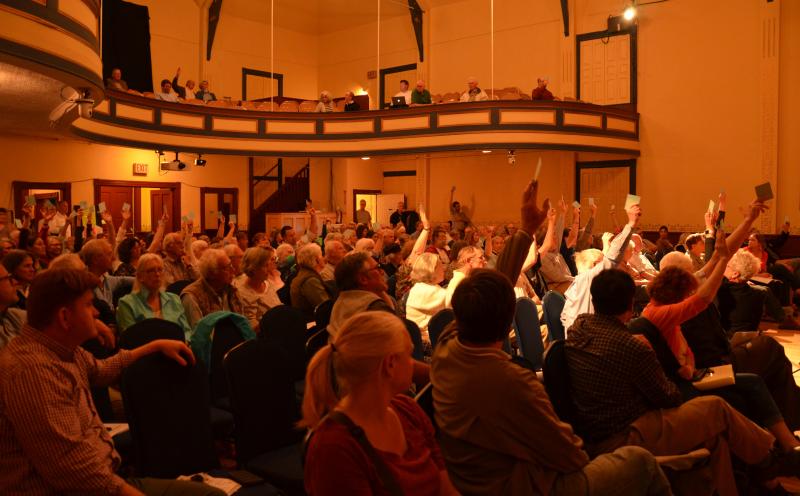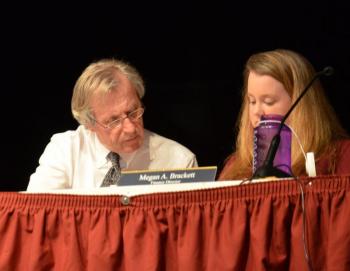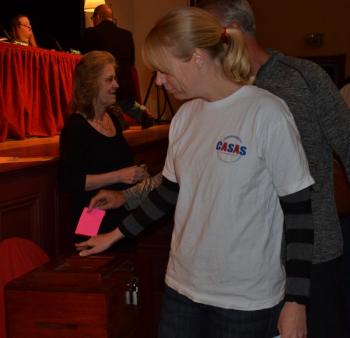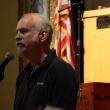ROCKPORT — The Rockport Opera House filled to the gills June 15 at annual town meeting, with citizens of all ages gathering to debate, sometimes heatedly, a $300,000 fiber optic expansion study, as well as a proposal to send town trash to EcoMaine, a Portland-based waste management facility.
Both issues drew more than 208 citizens to the Opera House, a record attendance given that over the last 15 years, annual town meeting has attracted, on average, 20 to 30 residents to discuss municipal spending and policy in sessions that generally lasted no more than 40 minutes.
This year was different. Town Meeting 2016 lasted almost three hours to the dot, and included many perspectives, testy exchanges, laughter, and debates that invoked even more debates about Roberts Rules of Order. In the end, citizens approved a $3.37 million budget, defeated the fiber optics study at a vote of 92 to 59, and rejected the recommendation of Mid-Coast Solid Waste Corporation to send Camden, Hope, Lincolnville and Rockport trash to EcoMaine in Portland, when the current contract with Penobscot Energy Recovery Corporation ends in 2018.
Moderator Bob Duke convened the meeting at 7:10 p.m., delaying the start to allow the line of people at the Opera House entrance to find seats. He welcomed the town, remarking on town meetings past.
“This is not a race to get out the door,” he said. “Back in the old days there was always a cantankerous guy in the back yelling. I loved it.”
Duke dispensed with business completed the day before at the polls, and added that both Mark Kelley and Chris Farley had received 98 and 7 write-in votes, respectively, for the Budget Committee. Duke reported that both had agreed to serve on that committee.
There were a few questions concerning budget lines, in particular, administrative and assessing. Resident Alex Armentrout asked why that department’s expenses had increased from 2015, despite the completion of last year’s property revaluation.
Town Manager Rick Bates and Finance Director Megan Brackett responded that the assessor’s salary had increased, but half of that, $63,000, would be offset in the town’s revenue line with money coming from Camden. This past winter, Camden and Rockport agreed to share the assessor’s post, with Rockport’s assessor now spending 50 percent of the time in Camden.
Armentrout also asked why the town had a new budget line, the “publicly funded utilities.”
Bates explained that the line used to be called “street lights,” but the town was now to include fire hydrants and street lights; hence, the name change.
Fiber to Premise Network Study
After sailing through, and approving, expenditures associated with public works, public safety, recreation and culture, townspeople settled in to debate Article 14: “To see if the town will vote to raise and appropriate for engineering and design of a municipally-owned fiber to the premise network (FTTP) to serve all Rockport residents and businesses.”
The cost of that design and engineering study was set at $300,000, and both the Budget Committee and Select Board had recommended its approval.
More than a dozen citizens lined up to speak at the microphone, speaking to the Select Board and other town officials, who sat behind a table on the stage, or turned around to speak directly the citizens.
Some questioned the need for high speed internet, saying taxpayers should not subsidize video game playing and movie watching.
They cited the project as costly and burdensome.
John Viehman, chairman of the town’s Technology Committee, said the proposal was not about voting to build the network, it was, he said, “a vote to hire someone to figure out what a high speed network would look like and cost.”
The Select Board has been exploring for several years the possibility of expanding the town’s high speed fiber optic cable capacity from the village to encompass Rockport’s entire geography and serve approximately 2,000 customers.
They have envisioned a publicly-owned broadband internet infrastructure based on other municipalities around the country.
The goal has been to remove the uncertainty associated with privately owned internet providers and replace it with a municipally owned utility, and in doing so, encourage and sustain contemporary business and enterprise.
“Over 400 communities nationwide have already done this, so this is not new,” said Viehman. “It is new to Rockport but not new to the country.”
But some disagreed.
Bill Freeman questioned whether it is up to taxpayer to fund every resident of town to watch movies and play video games. He said the argument that the network would attract business to town was shaky, given that businesses can already connect to high speed internet cable along Route 1.
He said the priorities of the town must consider competing projects — remodeling the Camden-Rockport Middle School, building a new library, building a new Midcoast School of Technology building in Rockland, “or expand the internet.”
“Money is best spent on education and children in this town,” he said. “That is the best return on the dollar.” He warned, “property owners are being put on notice that this is another tax on our backs to pay.”
David Wichenbach said: “The design cost is in left field. No one knows what the bill is going to be. Once the system is built, the whole town has to subsidize. It’s not a freebie to the town.”
Plus, he said: “Who is going to pay when some drunk takes down a pole? Anything government gets its finger into, it all goes to pot.”
Phil Lewis stood at the microphone, and being a former city council member in the Houston area, governing a population of 15,000, he recounted how that municipality considered — and rejected — a similar broadband proposal.
With a thick Texas flourish to his words, he said that Rockport already had “ample broadband services,” and added that 21 states now have laws against, or or restrictions on, municipally owned networks.
Deborah Hall, on the other hand, said she led an effort in another state to take fiber optics to 500 homes. That effort resulted in the fact that the “average resident is now saving 100 dollars every month in getting rid of Comcast.”
She recounted how the fiber optic system already in place in Rockport was a draw for her family to return to live in the town. They improved their internet on Russell Avenue by personally spending the money to extend the fiber to their home, and consequently “reduced our collective internet and television bills by $155 a month. That’s over 50 percent.”
“We can talk about all these other places, but I’m telling you this happened in Rockport,” she said. “This is about reducing your monthly payment, not increasing it,” she said.
Aaron Annis, who grew up in Rockport and told the town that he hoped to remain a resident, said: “I am business owner but on a the international level. This is the type of thing that comes around every once in awhile. This isn’t just for the right now but for the future. When you have fiber, it’s like water in the desert; when you put that water in, it grows. I plan on having my company be successful. I don’t want to have to go to New York and other towns and put my money in other places.”
He said the fiber network would allow another generation of people to build a livelihood in Rockport.
“This town isn’t always going to be vacation place that you come to for a few months,” he said. “Take the chance on this small investment ,which could turn out to be a major investment for a long time.”
Thomas R. Murphy said he also grew up in town but said: “I am leaving this town to seek a technology career, and am moving to Austin. I have to do this because we do not have technology in this town.”
He warned that sticking with the status quo, residents were paying a company “to make profits and take profts to shareholders in other places.”
He said the fiber infrastructure already existed in parts of Rockport, and which is not being used.
“We can keep our resources here and improve lives of everyone. This is an investment we need to make for our future. Costs can be spread thoughtfully by the town, and we can pay forward to the future of the town.”
He added: “There are reasons why states are against the municipal systems. The same capitalist comapnies are using your money to ensure they can keep their monoloploy in effect, and get money to shareholders. They have lobbied against municipalities having fiber.”
Margo Murphy, a teacher and West Rockport resident, said that in her neighborhood, there was but “one pipe going down street, Time Warner.”
She gets up at 4 a.m. to get work done because at other times of the day, the neighborhood use of the “pipe” slows down internet speed.
“How do we grow work in the community,” she asked. “Work is very different today than 10 years ago. This is an issue about equity and work. It’s a smart thing to do, because it is about creating sustainability for this community.”
Daniel Dibner said he had experience with the technology elsewhere in the world.
“We are being asked to fund something we are being told will last a long time, but the technology changes and changes significantly,” he said.
Moreover, “We live in Rockport, Maine, and the wind and snow and ice ensures that if there is damage it goes with the territory. The only people who need a gig is a business.”
Kathleen Meil said the: “conversation is vitally important. The conversation is not about installing network at any cost. Islesboro had the same conversations. In the end, Islesboro decided to invest money to find out what they would face. This weekend, they will vote whether to invest or not. This is a small amount of money to know if this is cost effective or not. This is just the beginning of the conversation, not the end.”
Rockport resident Michael Forcello, coowner of Redzone, a wireless network, said his company’s internet speed had doubled over the last 12 months and the cost has declined in the last 12 months.
The internet is a utility, he said. “Not a public utility but a utility with public value.”
He warned against the town taking the risk.
“Innovation will solve this problem,” he said.
Brooke Kehoe said her family already faced a $300 property tax increase after the municipal assessments concluded, and when the “wealthiest homeowners got tax breaks.”
“ Our taxes went up $300,” she said, “No one came to see our house. This study will raise our taxes another $150. Retirees in Rockport can’t afford to live here anymore. I’m not even a retiree and I can’t afford this study. It’s not going to save me money because my internet costs are zero.”
As the debate about the network stretched over 90 minutes, some citizens began calling for a vote. But the process got temporaily muddled as one person called for a vote on the matter and others interrupted.
“We are going to vote to move to a vote,” commanded Duke.
The town agreed to vote, and then there was a show of hands, ultimately defeating the study proposal.
EcoMaine or Fiberight
The other controversial issue on the warrant was Article 21, which asked the town if it agreed to contract with EcoMaine, of Portland, beginning in 2018, to dispose of municipal solid waste. Dissenting opinion argued that the town consider contracting instead with Fiberight, a different company proposing an alternative waste disposal technology at a yet-to-be-constructed plant in Hampden.
At first, the sentiment was building toward the EcoMaine proposal, but the tide shifted around 9:30 p.m. when those who remained in the Opera House learned that Camden voters, also attending their annual town meeting three miles away at the Camden Opera House, voted down a similar warrant article proposing to contract with EcoMaine.
Delivering that news was Fiberight chief executive officer and founder Craig Stuart-Paul, who had appeared at the Rockport Town Meeting to answer questions.
Select Board Chairman Bill Chapman gave a brief overview of the situation.
He said the town’s contract with PERC for incinerating solid waste in Orrington expires in 2018. Rockport has been trucking its trash there since the mid-1980s.
“For the last three or four years, we have recognized that the contract is coming to the end,” he said.
One option for the future was to partner with Fiberight.
At same time, the town managers of Camden, Hope, Lincolnville and Rockport were directed to study the options. They subsequently recommended going with EcoMaine, a waste disposal and trash-burning facility in Portland.
Rockport Select Board member Tracy Murphy said the board heard presentations from four companies.
“People voted for EcoMaine for a lot reasons,” she said. “The reason I voted for EcoMaine was because it is a mature company with money in the bank, and it is a nonprofit, and money goes back to member communities. Fiberight does not have facility in place; it is not built, and it has investors who expect a return on investment.”
Proponents of sticking with the EcoMaine proposal said it is important for all four towns to agree.
“If we break up, have to go back to starting board,” said Murphy.
Rockport resident Maggie Timmerman urged a no vote on the article, saying fiberight would be cheaper and more environmentally sound.
“With EcoMaine it is business as usual,” she said. “The trash will be burned. Fiberight will take out recyclables and by using anaerobic digestives, will turn organics into biogas. Some of this would be reserved to fuel a fleet of vehicles.”
Maine Representative Joan Welsh, D-Rockport, said her concern is that “it is not fully developed. There is nothing like it in the form it is being proposed in any part of the country or the world. So we would be the first and that concerns me.”
An EcoMaine representative at the Rockport Town Meeting said Rockport’s contract, if approved, would be for 20 years, but would have a five-year opt-out clause.
“The community could vote to get out with no penalty all,” she said.
But she warned later in the meeting that EcoMaine was reaching its operational capacity.
“There is no penalty per se but there is a risk we could become actually full,” she said.
Fiberight reported at the meeting that it obtained its Maine Department of Environmental Protection permits June 15, and anticipated its plant would be finished and operational by 2017.
Select Board member Owen Casas said he was “not uncomfortable with Fiberight,” and suggested the town could continue talking with the company.
By the time the vote was taken, citizens were warming up to hearing more about Fiberight, as well as improvements to the reduce, recycle and reuse plans for the transfer station on Union Street.
The final vote was 69 against the EcoMaine proposal and 26 in favor.
Post-meeting
After the town meeting concluded, at 9:59 p.m., the Select Board convened. Outgoing member Tracy Murphy was honored and given a vase of flowers, and Brendan Riordan, who assumed her seat, was sworn in by Town Clerk Linda Greenlaw.
Then, the board elected Bill Chapman to be chairman, again.
Reach Editorial Director Lynda Clancy at lyndaclancy@penbaypilot.com; 207-706-6657










































